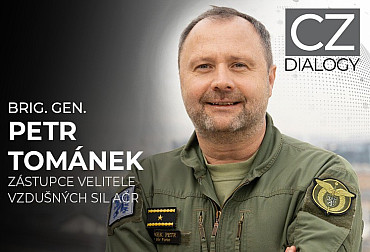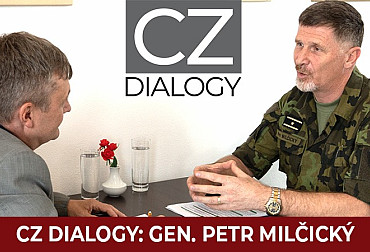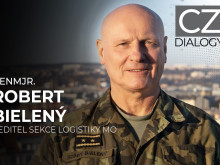Commander of the Multinational Battle Group in Slovakia Colonel Karel Navrátil: In case of any operation we are ready
The Multinational Battle Group Slovakia (MN BG SVK) was established in the spring of 2022 as part of an effort to strengthen the eastern flank of the North Atlantic Treaty Organization due to Russia's unprovoked aggression against Ukraine. NATO therefore decided to provide an Alliance presence in Slovakia, Hungary, Romania and Bulgaria. In addition to Czech and Slovak troops, troops from the United States, Germany and Slovenia are also part of this Battlegroup in the military area of Lesht near Zvolen. The commander of the Multinational Battle Group Slovakia is Colonel Karel Navrátil, who took over the 2nd rotation of the mission on 12 December. At the end of March this year, the battalion was certified "Combat Ready". The Commission was represented at that time by 24 international inspectors, including two NATO monitors from the Hungarian Multinational Division Centre. A total of 5 areas were assessed – preparation, operations, support, communication and information systems and administration. Our editorial team had the opportunity to speak with representatives of all units: executive officer of the U.S. Army Lieutenant Jonathan Alvendia, Bundeswehr unit member Major and medic Stefanie Böckler, deputy company commander Lieutenant Jake Babulc, Colonel Alexander Schober – deputy commander of MN BG SVK and of course the commander of Multinational Battle Group Slovakia Colonel Karel Navrátil.
Video: Interviews with all representatives of the member countries of the Multinational Battle Group Slovakia / CZ DEFENCE
Multinational Battle Group Slovakia is built on the basis of a mechanized battalion, which is composed of five basic manoeuvre units, mechanized companies of the Czech Army, Slovenian Army, German Army, United States Army and together with the Slovak side form a mortar battery. "We are supported by combat support and combat support units, which are also multinational. If we are talking about troop numbers, I probably won't give a completely accurate number. We are moving within the mandate announced by the Slovak National Council. In terms of expertise, we are primarily a mechanised unit. This means that our main fighting force is armoured infantry support vehicles, and fire support is provided by Czech and Slovak mortars. We have additional means for conducting combat operations, for reconnaissance, remote sensing and aerial reconnaissance, and I am talking now mainly about unmanned means, about drones. And, of course, our logistic support is an integral part of it," Colonel Navrátil introduces the composition of the Slovak battlegroup and also highly evaluates the joint five-month stay with the unit.
"We have been able to clearly define our objectives and we have identified procedures to achieve those objectives. We have joint training. Of course, at the beginning everything was not ideal, but over time the units became aligned and we started to operate as a single, let's say, coherent motivated unit that achieved the declared capabilities, which was verified in the certification exercise that took place in the second decade of March.
At the moment, it is a unit that is fully usable and deployable in the event of any operation," said the commander of the Multinational Battle Group Slovakia. If we look for the specifics of the Slovak battlegroup, Colonel Navrátil points out two: "First of all, we have experience from combat missions, but this is a different way of orienting the mission towards training. Another specificity is the fact that the unit operates in the middle of a country where standard peacetime conditions operate, so it is possible to adjust the functioning of the battalion after training, for example, by attending cultural events, and it is also possible to do some simple shopping.
 Picture: In this special episode of our discussion show CZ DIALOGY, we talked with the commander of Multinational Battle Group Slovakia, Colonel Karel Navratil | Jan Juřica / CZ DEFENCE
Picture: In this special episode of our discussion show CZ DIALOGY, we talked with the commander of Multinational Battle Group Slovakia, Colonel Karel Navratil | Jan Juřica / CZ DEFENCE
The battalion will have a regular rotation, during which some changes in equipment will be made," Colonel Navrátil explained. "The first change is likely to be the replacement of the German mechanised unit with a German tank company, which will significantly increase tactical capabilities. Our wheeled combat vehicles will be replaced by tracked infantry fighting vehicles," says Colonel Navrátil, the commander of the Slovak battle group, who adds that the biggest reinforcement will be the presence of German Leopard tanks.
An important part of the Slovak multinational group is the presence of soldiers in active reserve, which Colonel Navrátil sees as positive. "The reservists who are here with us have proven themselves very well. When you look at a unit today, you cannot tell who is a reservist and who is a professional soldier. These reservists have completely blended in and are training, exercising, living in the same conditions as us, in the discomfort that military service abroad brings. I would add that training in a multinational environment also brings language experience. There are not only Czechs around you, you have to communicate in English. This gives the active reserve soldiers a lot of experience and I think this is an ideal mission for the active reserve soldiers to rotate and train here," said Colonel Karel Navrátil, Commander of the Multinational Battle Group Slovakia.
During our visit to the Multinational Battle Group Slovakia, we also had the opportunity to speak with all the representatives of the foreign units. In order for the Multinational Battalion to function optimally, all activities must be coordinated, which can be a problem with the different structure of the teams in each army. "If the commanders know the task they are ready for, the minor differences are able to be communicated, coordinated and completed," said Lt. Jonathan Alvendia - U.S. Army executive officer. He said adapting to the approach and training method of other allies in this mission has not been difficult either. "We train regularly. Every two or three months, we get together with this battle group and train, learn each other's capabilities, and in between, two to three times a week, we practice on the range and practice building rear support with our allies," Lieutenant said.
 Picture: Interview with U.S. Army Executive Officer Lieutenant Jonathan Alvendia | Jan Juřica / CZ DEFENCE
Picture: Interview with U.S. Army Executive Officer Lieutenant Jonathan Alvendia | Jan Juřica / CZ DEFENCE
Major Stefanie Böckler, a Bundeswehr representative, sees the cooperation within the Slovak battlegroup as similarly seamless. "My experience was really good. We showed that we can fight together if necessary. We have certain NATO standards and every nation, especially medical professionals within NATO, know how to take care of patients, how to work together. It is good to see that we can fight together, but of course we have things to work on. For example, we had problems with radio communications. Our German radios aren't very compatible with other nations' radios, but if we train longer we'll figure it out and then we can continue to work together."
 Picture: Interview with Bundeswehr unit member Major and doctor Stefanie Böckler | Jan Juřica / CZ DEFENCE
Picture: Interview with Bundeswehr unit member Major and doctor Stefanie Böckler | Jan Juřica / CZ DEFENCE
Lieutenant Jaka Babulč – Deputy Company Commander of the Slovenian Armed Forces – also sees gaining valuable experience, including inspiration for further training. "I am convinced that international military cooperation, here within this grouping, has given us as a unit many different methods, approaches and solutions to tactical tasks at all levels. It's a great experience for every Soldier. Every Soldier can evaluate how we work and can compare it to how other units in other nations work. We can see what we are good at and in turn we can improve by learning from others."
 Picture: Interview with Lieutenant Jake Babulč, Deputy Company Commander | Jan Juřica / CZ DEFENCE
Picture: Interview with Lieutenant Jake Babulč, Deputy Company Commander | Jan Juřica / CZ DEFENCE
Like the commander of MN BG SVK, Colonel Navratil, we asked other representatives of the member states of the Slovak Multinational Group what they think makes this mission specific? "This mission is very different and specific because it is very close to the confrontations that are happening in Europe now and we are standing here in the lap, in the gap together with our allies. I have never worked so closely with other nations and it has been a pleasure," says Lt. Jonathan Alvendia. For Maj. Stefanie Böckler, the mission is special because the soldiers are closer than on other missions. "For example, a year ago on a mission in Norway, we worked perfectly together, but here on this mission we are one multinational medical team and we work and live together. So we have much closer ties to each other, and we see in much more detail how other nations work when there is a closer connection." Lieutenant Jaka Babulč, for whom this is his 4th overseas mission, also praises the readiness of the battalion. "All the units that joined this rotation were already well trained and prepared. The only thing we had to do was to train together so that we could operate as a battalion as one unit," Lieutenant said.
Slovakia, as the host country, had to make many logistical and organisational preparations in addition to the key decision to host this multinational military group on its territory, as confirmed by Colonel Alexander Schober - Deputy Commander of MN BG SVK. According to him, this was something completely new for Slovakia. "When a similar project started in 2016 in Poland and the Baltic States, everyone had relatively enough time, but in the case of the attack on Ukraine, everything changed. We have tasks ahead of us that we want to accomplish so that all NATO units that are in Slovakia have the necessary facilities and security for everyday life, including providing all-round training in cooperation with the Armed Forces of the Slovak Republic so that the overall idea of detention and demonstrated readiness is ensured. So it is a challenge. At the beginning it was a big logistical problem, but the representatives of the Slovak Republic, the Armed Forces and the Ministry of Defence gradually managed everything. We have achieved good results, but we still have a lot of work ahead of us."
 Picture: Interview with Colonel Alexander Schober - Deputy Commander of MN BG SVK | Jan Juřica / CZ DEFENCE
Picture: Interview with Colonel Alexander Schober - Deputy Commander of MN BG SVK | Jan Juřica / CZ DEFENCE
According to Colonel Schober, the deployment of the multinational force in Slovakia has been met with a positive reaction from the majority of the public. "This mission is specific for me as a member of the Armed Forces of the Slovak Republic and a citizen of Slovakia in that it is the first time that this international peacetime mission has been deployed in Slovakia. For example, we are dealing with legislative issues and other conditions that we are not used to as a society. Many may have thought that we would only be helping abroad, for example, in countries in Africa such as Eritrea, or Cyprus, Afghanistan or East Timor. We never thought after 1990 that there would be any near threat to the sovereignty or integrity of the Slovak Republic. What is happening in Ukraine is a defence, cultural and political-military shock for all of us, and we must set the necessary legislative and other steps. All of this has brought new challenges, and this is where it is specific," says Colonel Alexander Schober, Deputy Commander of MN BG SVK.
If you are interested in the complete interviews with all representatives of the member countries of the Multinational Battle Group Slovakia, watch the video at the beginning of this article.





















